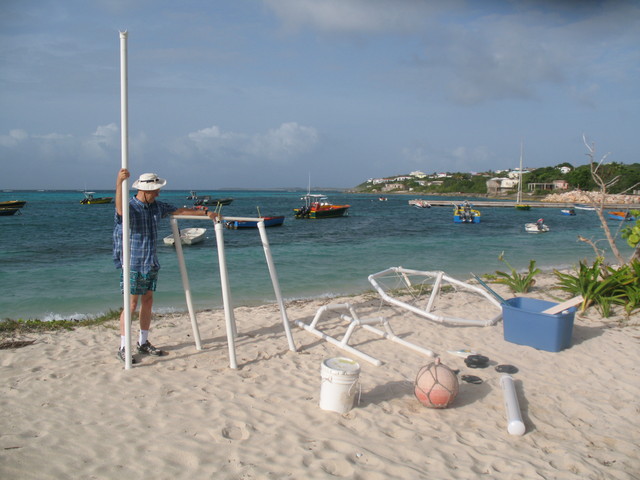Yale talk tonight moved
For those who are attending my talk at Yale tonight, it has moved to Dunham Labs room 220 (from William L. Harkness Hall, Room 119)
For those who are attending my talk at Yale tonight, it has moved to Dunham Labs room 220 (from William L. Harkness Hall, Room 119)
This segment has been in the works for quite awhile. I’ve gotten better at giving radio interviews since then, so I kind of wince when I hear it, but hey, all press is good press :). And it’s great to hear MI&T engineer Christian Cermelli speaking as well.

As you may have seen on the forums and his wiki pages, community member Vince Cate has been doing a lot of thinking about and working on seasteading. We met in Puerto Rico last week, and he had a lot of good ideas about the DIY approach and the benefits of single-family seasteads and community design, as well as the perils of using consultants.
 Ferrocement, a composite of metal and concrete, is one of our favored building materials. Because the strength to weight ratio is not as good as steel, ferrocement structures end up being heavier and slower, but that’s fine for our needs – in fact, that’s just the direction we want to compromise. So I was interested to stumble across a free online book: [_Fishing Boat Construction: 3.
Ferrocement, a composite of metal and concrete, is one of our favored building materials. Because the strength to weight ratio is not as good as steel, ferrocement structures end up being heavier and slower, but that’s fine for our needs – in fact, that’s just the direction we want to compromise. So I was interested to stumble across a free online book: [_Fishing Boat Construction: 3.
We just moved to a new website host, which should be faster and more reliable. Our previous (Dreamhost) was slow and often had serious problems under higher than normal load, and so this has been in the works for awhile. We had been planning to migrate in a few days, but when the site started crapping out again today, our volunteer sysadmin Ben went ahead and made the move this afternoon. We hope all of you will find the website experience to be improved.
 The Sea Shadow is one of the most famous SWATH ships – a black, futuristic looking vessel which was the basis for the stealth ship in the Bond movie Tomorrow Never Dies. Like our seastead designs, SWATH ships have high stability due to a low waterplane area, and a similar shape to the Sea Shadow is under consideration as a possibility for single-family seastead designs (our next engineering effort).
The Sea Shadow is one of the most famous SWATH ships – a black, futuristic looking vessel which was the basis for the stealth ship in the Bond movie Tomorrow Never Dies. Like our seastead designs, SWATH ships have high stability due to a low waterplane area, and a similar shape to the Sea Shadow is under consideration as a possibility for single-family seastead designs (our next engineering effort).
From James:
The TSI website is a cornerstone of our strategy to grow the seasteading movement over the next several years. It is one of our primary ways of communicating our message to people unfamiliar with seasteading, and it serves as a community hub for enthusiasts active in the seasteading movement. There’s a lot of software development and maintenance involved in making it the most effective community-building tool possible.
We’re looking for a volunteer to manage our website development team.
(This is new entry for our extended FAQ section in the book, written by TSI’s Director of Development Liz Lacy)
Recently I saw a blog post from someone who had heard about seasteading and was turned off by the idea, describing it as “a bunch of rich, entitled white guys wanting even more freedom and entitlement.” Now, I can understand that response, in fact I’d be lying if I didn’t say that my first response to the idea was somewhat similar.
I just wanted to share a recent email from James, our Director of Operations and Volunteer Coordinator, to current volunteers:
Hello TSI volunteers,
I’d like to give you a quick heads up about the progress of our volunteer program. This past week has been phenomenal — between our recent press coverage in Wired and CNET, and our networking at the BIL conference, we’ve doubled the size of our active volunteer team from about 10-20 people.